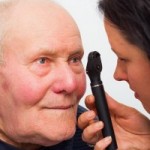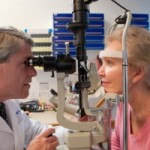

January is national glaucoma awareness month and so here at Bel Marr Health we compiled together the best of our glaucoma health news articles for you to enjoy and educate yourself about this serious eye problem which can rob you of your vision.
In its early stages glaucoma does not present itself with many symptoms and so it can progress quite significantly without even knowing it. If detected early on glaucoma can be controlled and well managed but if caught later on, any damage already caused cannot be reversed. This is why it’s so important to keep yourself informed in order to reduce your risk of developing glaucoma and keeping your vision.
So please enjoy the below articles in order to keep your eyes sharp and have you seeing for years to come.
 Certain yoga positions may impact eye pressure in glaucoma patients according to new findings. Positions which can increase eye discomfort in glaucoma patients are those where the head is in a downward position.
Certain yoga positions may impact eye pressure in glaucoma patients according to new findings. Positions which can increase eye discomfort in glaucoma patients are those where the head is in a downward position.
Glaucoma is the leading cause of irreversible blindness and can impact a person’s quality of life. When fluid pressure increases in the eye it leads to damage of the optic nerve and so minimizing fluid pressure can also work to reduce optic nerve damage which can contribute to blindness.
“While we encourage our patients to live active and healthy lifestyles, including physical exercise, certain types of activities, including pushups and lifting heavy weights, should be avoided by glaucoma patients due to the risk of increasing IOP and possibly damaging the optic nerve,” study author Robert Ritch explained. “This new study will help clinicians advise their patients on the potential risk associated with various yoga positions and other exercises that involve inverted poses.” Continue reading…
 For individuals with glaucoma – a condition leading to vision loss – researchers found that increased visual scanning behavior can improve their ability to drive and pass a driving test. To compensate for visual impairment, glaucoma patients can use increased scanning, especially frequent eye and head movements. Anthony Adams, O.D., Ph.D., editor-in-chief of Optometry and Vision Science, said, “Like most people, many glaucoma patients with binocular peripheral visual field loss can make useful adaptations for their condition.”
For individuals with glaucoma – a condition leading to vision loss – researchers found that increased visual scanning behavior can improve their ability to drive and pass a driving test. To compensate for visual impairment, glaucoma patients can use increased scanning, especially frequent eye and head movements. Anthony Adams, O.D., Ph.D., editor-in-chief of Optometry and Vision Science, said, “Like most people, many glaucoma patients with binocular peripheral visual field loss can make useful adaptations for their condition.”
The research was conducted at a state-of-the-art driving simulator at the Mercedes-Benz Center. The participants were six individuals with glaucoma and binocular vision loss who all partook in the driving simulation. The simulation had close to real-life conditions with 360-degree visual projection, a real car and a moving base. Continue reading…
 A recent study by scientists at Michigan State University suggests that even drug resistant tuberculosis can be effectively treated with a common glaucoma medication.
A recent study by scientists at Michigan State University suggests that even drug resistant tuberculosis can be effectively treated with a common glaucoma medication.
The study, which was led by MSU microbiologist Robert Abramovitch and graduate student Benjamin Johnson, is published in current issue of Antimicrobial Agents and Chemotherapy.
The scientists discovered that the sulfonamide medication – ethoxzolamide – that is found in many prescription glaucoma drugs can effectively turn off Mycobacterium Tuberculosis’s ability to invade the immune system. The team found ethoxzolamide reduces disease symptoms in mice. Continue reading…
 Rheumatoid arthritis (RA) can increase the risk of dry eyes, glaucoma and cataracts. Rheumatoid arthritis is an autoimmune disease where the immune system attacks the joints causing inflammation and pain. Aside from affecting joints, rheumatoid arthritis can also affect the eyes as well.
Rheumatoid arthritis (RA) can increase the risk of dry eyes, glaucoma and cataracts. Rheumatoid arthritis is an autoimmune disease where the immune system attacks the joints causing inflammation and pain. Aside from affecting joints, rheumatoid arthritis can also affect the eyes as well.
Due to the influx of inflammation, RA can lead to serious eye disorders as well. Rheumatoid arthritis has been found to increase the risk of Sjogren’s syndrome, a condition that affects the production of tears. With rheumatoid arthritis eyes can become dry and a white haze can even form over them. If you have rheumatoid arthritis, it’s important to get frequent eye exams to catch changes or issues early on. Continue reading…
Copyright © www.orthopaedics.win Bone Health All Rights Reserved